
Will Moldova vote to join the EU despite Russia’s influence?
On October 20, the population of a small, neutral, quadrilingual country will vote on EU accession. Moldova, which borders Ukraine, is home to many Russia sympathisers. How will this affect the results of the referendum?
We were already taking our leave from a Transnistrian in Gagauzia when he began rhapsodising about the Swiss cantons and how in Switzerland, each canton can pursue its own policy.
Piotr Pusca worked as an electrical engineer for 48 years: first in Kharkiv, eastern Ukraine, and later here in Gagauzia. He grew up in Transnistria. Back then, it was all part of the Soviet Union.
Today, Transnistria is an unrecognised, de facto state, between the Republic of Moldova and Ukraine, where around 1,700 Russian soldiers are stationed. The Russian military has been attacking Kharkiv for over two years.
Despite this, many in Gagauzia, in the south of Moldova, are in favour of close relations with Russia. There is more sympathy for Russia here than anywhere else in the country, which will hold presidential elections and vote on joining the European Union on October 20.
On that day, voters must decide whether Moldova will insert the goal of EU accession in its constitution.
The country of 2.5 million inhabitants is one of the poorest in Europe and has been in particular danger since the start of the Russian invasion of neighbouring Ukraine.
The Swiss foreign ministry describes relations with Moldova as “very good” and increasingly intensive. According to the ministry, Switzerland was one of Moldova’s “most important bilateral donors in 2023”.
Switzerland’s earliest involvement in Moldova was in the health sector, while other areas of activity include economic development and local governance.
Since the beginning of the war in Ukraine, Switzerland has also contributed support for Ukrainian refugees in Moldova. Among other things, Swiss funds are channelled into democracy education, which has been an integral part of school education for the past five years.
Switzerland is therefore among those helping to shape the development of democracy in Moldova.
At the same time, Moldova has much in common with Switzerland: it is a small, quadrilingual and neutral landlocked country. In 1992, when Switzerland voted “no” in the decisive referendum on European integration, the Republic of Moldova had only existed for just over a year. Is the country now at a similar crossroads?
Russia as the lesser evil
“I’m going to vote, and I’m going to vote against European integration,” Pusca says. Russia supplies the gas; Russia is the lesser evil, he says. Pusca is furious and does not trust the government. “Everyone who disagrees with President Maia Sandu is being portrayed as a Russian agent,” he laments.
Scepticism about politicians is understandable in Moldova. Until five years ago, the country was under the influence of the oligarch Vladimir Plahotniuc, who – as the German magazine Der SpiegelExternal link put it – “hijacked the state” in a “republic riven by corruption”. Since then, however, the country has made progress.
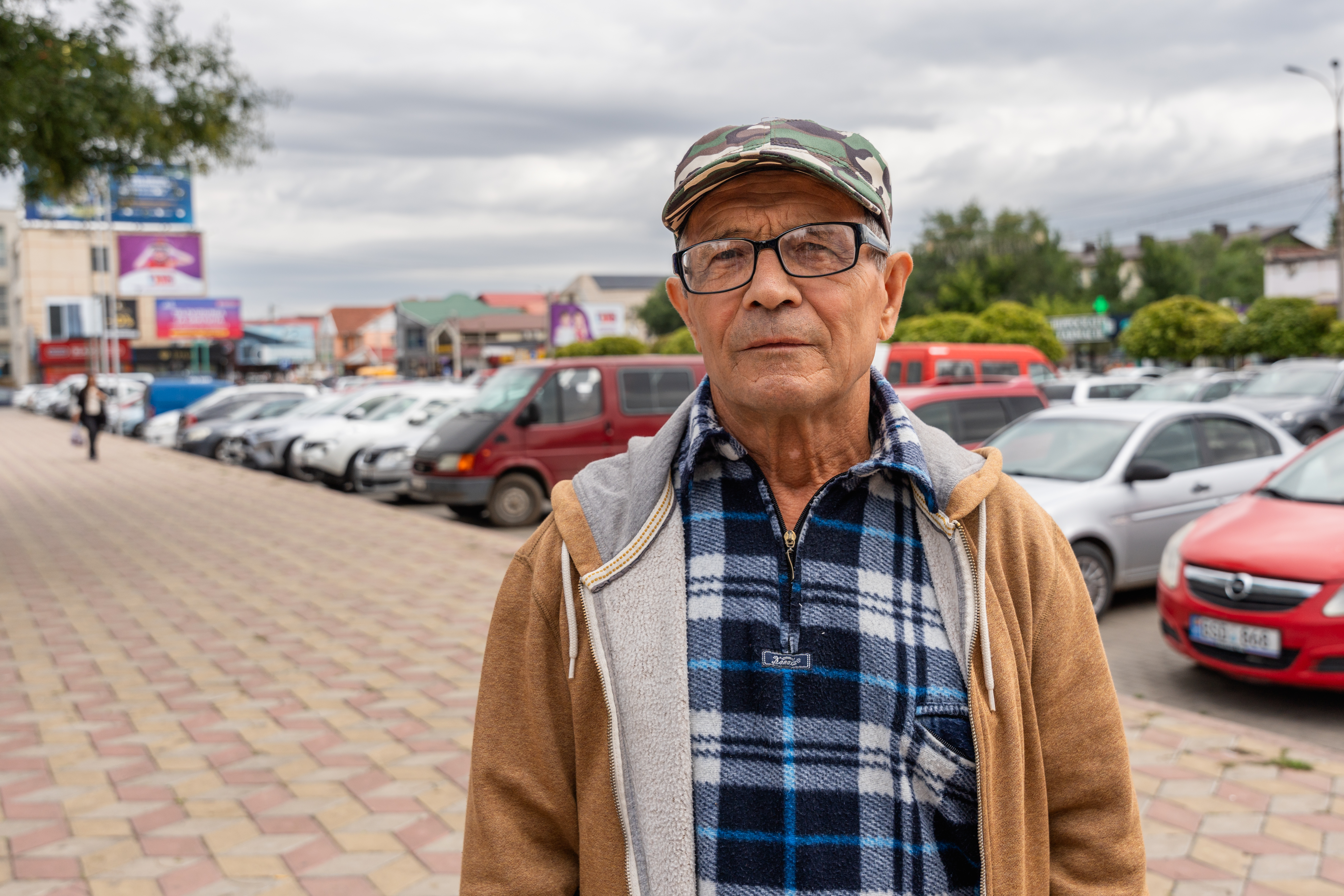
But not in Pusca’s view. He maintains that the European Union or the United States would intervene if the pro-European president, Maia Sandu, is not re-elected. Yet he sees the federalism of Switzerland or the US as exemplary. Why is that?
“In Switzerland or the United States, each state can make its own laws,” Pusca says. Switzerland is a small country, he adds; the great powers of the 19th century decided that it should remain independent and neutral. In Switzerland, each canton can decide for itself which language it wants to have, Pusca points out.
Pusca is not the only person in Gagauzia who knows Switzerland. A Gagauzian head of government once told the Neue Zürcher Zeitung that he would like to see a “kind of Swiss model” for Moldova. Yet the Gagauzia region already has comprehensive autonomy.
Around four out of five Moldovans speak Romanian as their first language. Recognised minority languages are Russian, Ukrainian and the Turkic language Gagauz.
In Comrat, the capital of Gagauzia, almost everyone speaks Russian or Gagauz. On the town square, an advertisement from the Moldovan government in Romanian reads: “Europe for you”. Schools have been renovated, leisure centres opened and photovoltaic systems installed. Pusca thinks the government should also provide information in Russian and Gagauz.
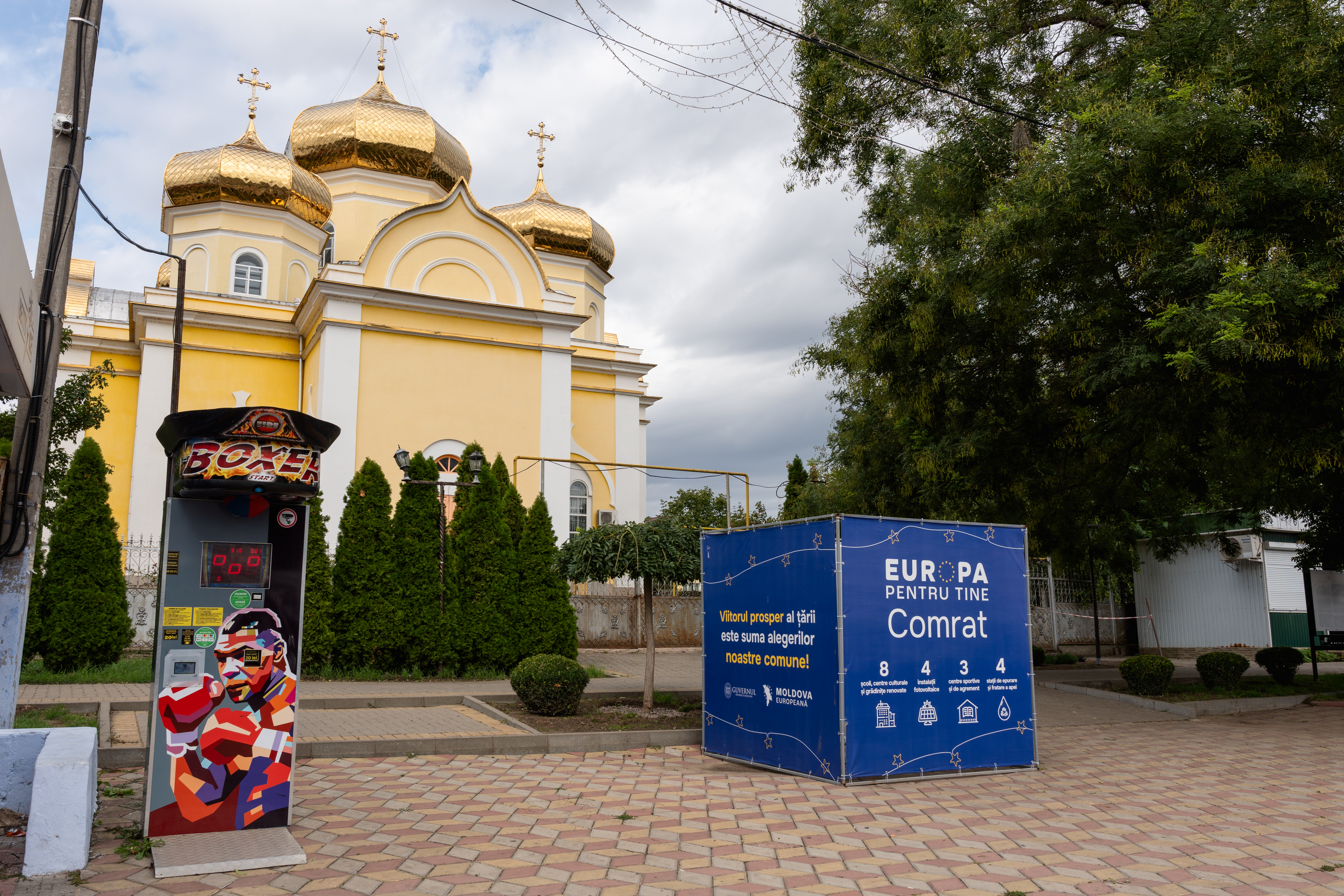
When we later ask Mihail Sirkeli whether the government’s choice of language was not insensitive, the journalist raises his voice: “This is not Switzerland! You have to change your perspective. You can only respect other identities once you have a strong identity yourself.” Sirkeli is the founder of the online media platform Nokta.
A people divided
Nokta is the only explicitly pro-European medium in Gagauzia, funded primarily by the US State Department, the Netherlands and the US National Endowment for Democracy. Nokta offers a different perspective, says Sirkeli, not only on the current situation, but also on the country’s history.
“The Russian Empire and later the Soviet Union pursued a policy of Russification – assimilating peoples and killing identities,” he says.
Russians were in charge in the Soviet Republic of Moldova. Anyone who wanted to make a career had to speak Russian. “That’s why they still want to replace Romanian with Russian today,” Sirkeli says. For him, this is the reason why the text on the EU billboard on Comrat’s town square should not be in Russian.
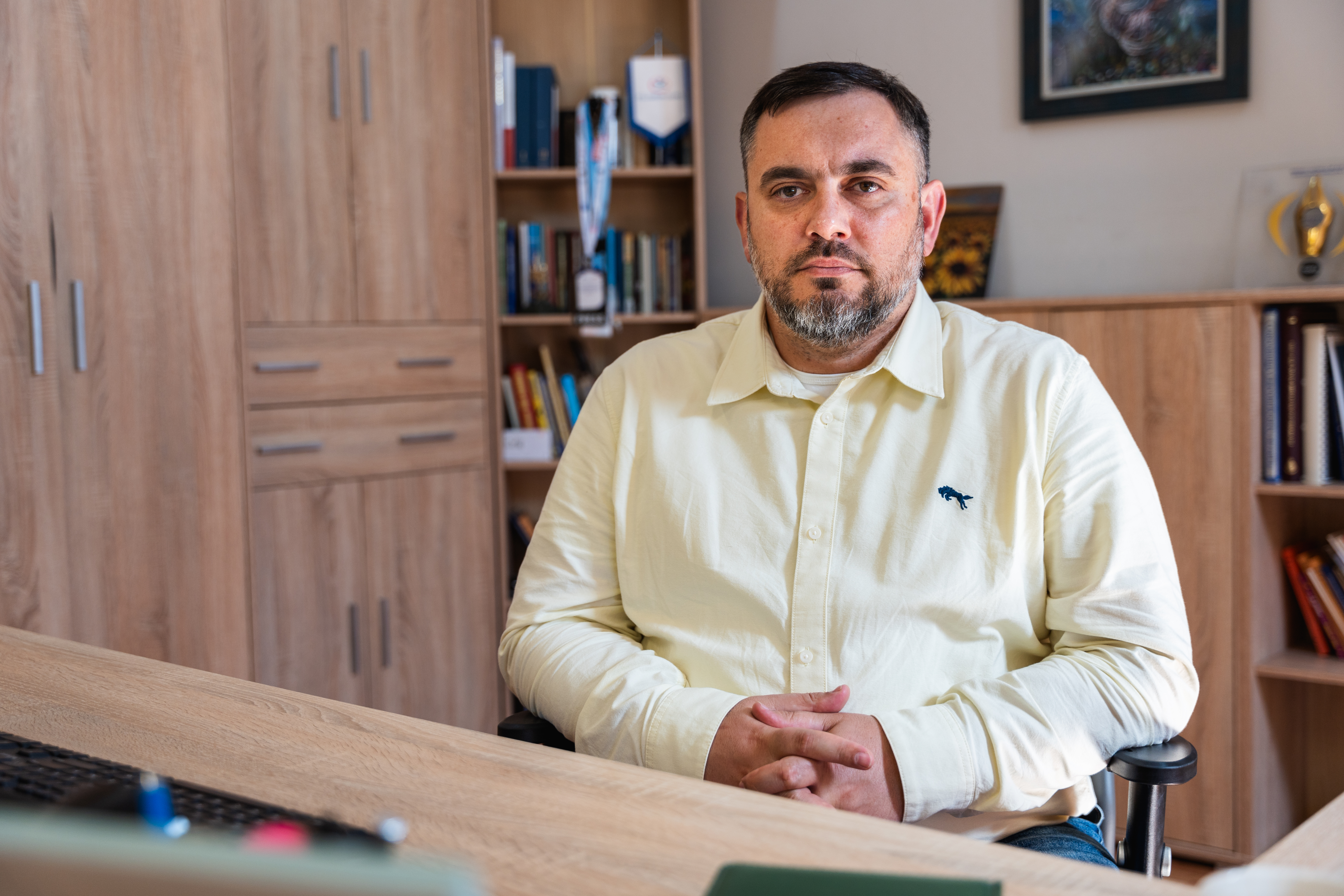
But if the EU billboard had been printed in Gagauz, wouldn’t that have shown respect for the local identity? Sirkeli is Gagauz himself. He says the language is dying.
“They probably could have done that,” Sirkeli says. “But this advert won’t change the way people think. People are already divided. Maybe 5% are wavering. The others made up their minds a long time ago.” In 2014, there was a referendum just in the Gagauzia region. Back then, over 97% voted against EU rapprochementExternal link.
Almost no other country is as exposed to Russian disinformation as Moldova – and within the country, no other region is as exposed to it as Gagauzia.
Russian influence in Gagauzia
Evghenia Gutul, who visited Vladimir Putin as recently as this year and was elected to represent the now banned Șor party, governs here. The party bore the name of its leader Ilan Shor who, according to analysis by the non-governmental organisation Promo-LEX, appears to be the coordinator of Russia’s “main manifestations of hybrid warfare”External link in Moldova.
Shor left the country after being convicted for his role in the biggest corruption case of the 2010s. “Ilan Shor is a criminal and the main organiser of a billion-dollar robbery of Moldovan banks,” Sirkeli says. “Today Ilan Shor is an instrument of the Kremlin. He invests Russian money in Moldova’s politics and is trying to destabilise the country.”
The money is visible in Comrat: posters advertising Shor’s free leisure park Gagauziya-Land are everywhere. Poorer people can buy discounted products in the MeriSor shop. Although the party is banned, we find an apparently intact party office, with a smiling cardboard figure of Shor inside.
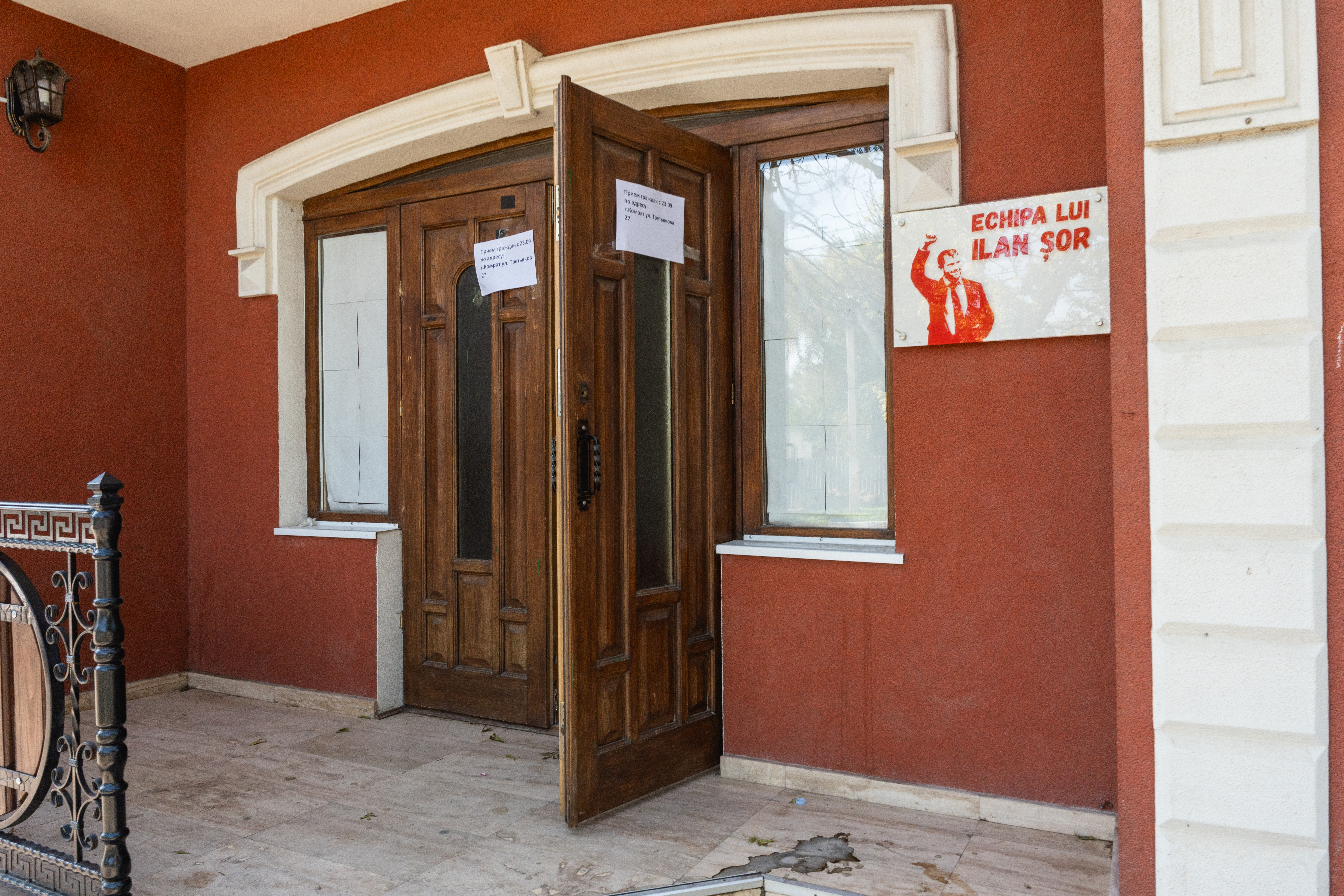
In this environment, Nokta provides journalistic information. An explanatory article has also been published on the referendum, explaining the current situation and what is at stake.
According to Sirkeli, there are hardly any discussions with dissenters. “There is no debate,” he says. When asked what the point of a referendum without a debate is, he says: “The point of the referendum is to show that the majority in Moldova is in favour of European integration. That’s the way it is.” He hopes and believes that the majority will say yes. “But I live in an area where people think differently.”
Gagauzia is home to around 4% of Moldovans. Their sympathy for Russia will therefore not determine the outcome of the vote. It is a poor region. But the journey from Comrat along the EU-funded motorway is smoother than almost anywhere else in Moldova.
A few dozen kilometres before Chisinau, the shaking and rattling starts. In the Moldovan capital, the mood is different: in mid-September, the government building is clad in a larger-than-life EU flag and a national flag. European emblems are everywhere, in parks and on signs.
Ambivalent opinions on the war in Ukraine
The wide divides in the debate are also due to Russian interference in Moldova’s politics. “Public discourse is dominated by a pro-Western, pro-Ukrainian perspective,” says the sociologist Petru Negura.
Negura finds it legitimate that the government has banned some media that reproduce Russian propaganda. However, there is a lack of platforms reflecting pro-Russian opinions and ambivalent perspectives, he says. “That’s why many Russia supporters get their information from alternative sources, including war propaganda.”
In August 2023, 33.9% of Moldovans believed that Russia bore sole responsibility for the invasion of Ukraine, 25.1% perceived Russia to be in the right, 23.9% said they thought neither side was in the right and 15.6% did not answer at all.
“Sociologically, this is interesting,” Negura says. “These ambivalent people could act as mediators in Moldovan society after the end of the war. Most of them are in favour of neutrality, want to expand Moldova’s neutrality, and are afraid the conflict will engulf Moldova.” But according to his analysis, these voices are barely heard in public.
Longing for ‘real liberals, conservatives and leftists’
There are a few critical voices that are not suspected as Russian propaganda. The left-wing activist, political scientist and journalist Vitalie Sprinceana will “probably” not vote in the referendum because there is nothing at stake, he says. Back in 2017, the Constitutional CourtExternal link ruled that the constitution was pro-European.
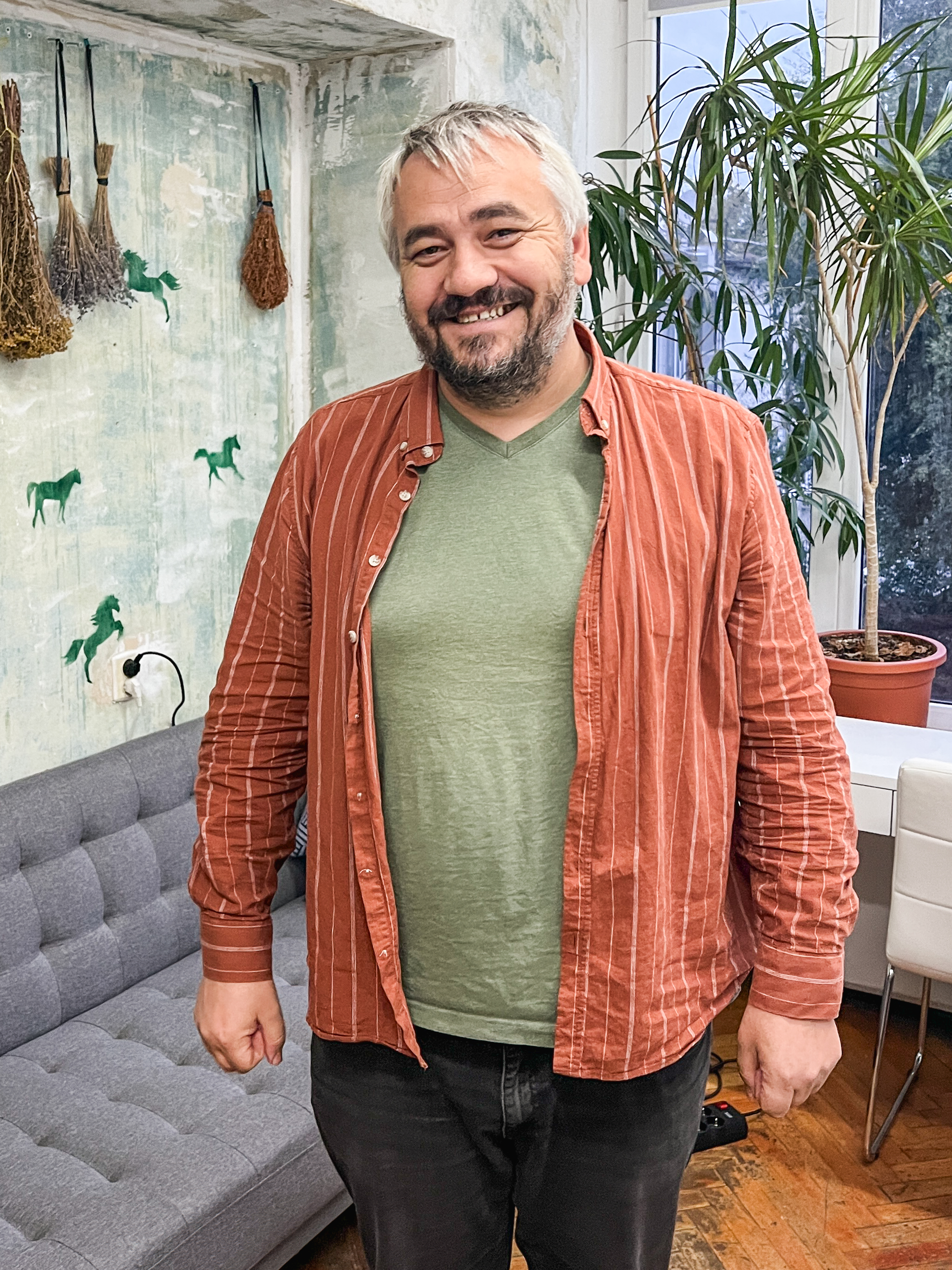
Sprinceana explains with regret that politics is not really political in Moldova. He would like to see “real liberals, real conservatives and, of course, real leftists”. Many of “the so-called left” are very conservative, for example, he says, but these beliefs have been eroded by geopolitics. The left-right division is based solely on the question of whether one is pro-Russian or pro-European.
In other words, politics is geopolitics. “This dichotomy is dangerous and tricky,” Sprinceana says. He would like to see a democracy with in-depth debate. But there is little room for this at the moment – not even in relation to the EU.
“People confuse the European Union and NATO,” says Dorina Rosca, a social scientist. “The fact that you can belong to the EU and be neutral is not understood.” She sees a lack of knowledge as the cause. “For now we still have a lot of work to do on the political culture. As a first step, people need to be informed about processes. At the moment, not even the media is doing this work.”
The large Moldovan diaspora in the EU and Russia
Rosca is the president of the Institut Européen d’Etudes du Développement in Paris. After many years abroad, she lives between two countries, Moldova and France. Among other things, she has conducted research on the diaspora.
Over a million Moldovans have had “migration experience” in the last 30 years. In 1989, Moldova had a population of 4.3 million people. Today it is 2.5 million.
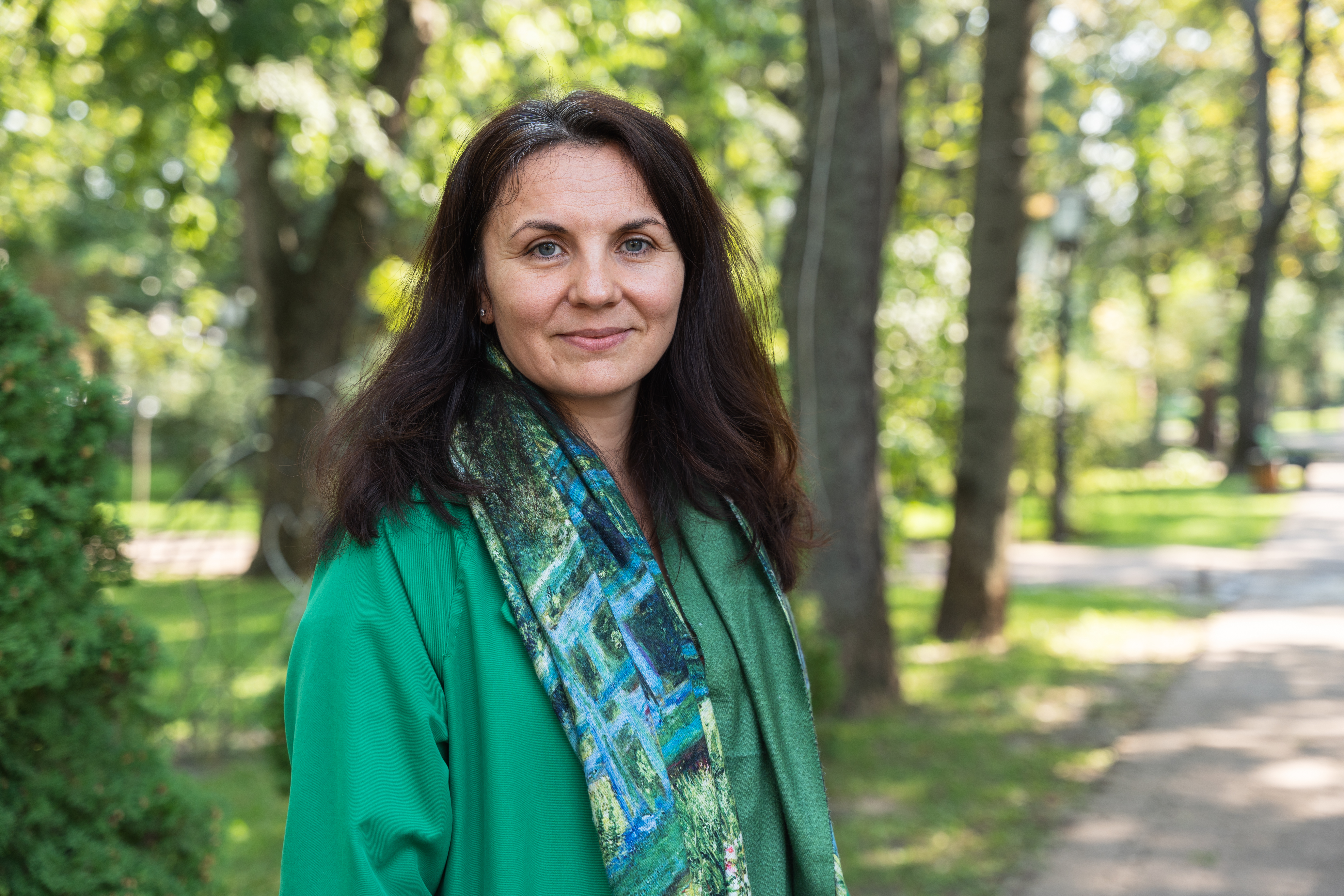
“At one time, up until 2010, many people emigrated to Russia. It was easier and cheaper. There was no language barrier and there was cultural familiarity,” Rosca explains. After visas became easier to obtain, by 2014 at the latest, migration flows shifted towards western Europe. “Today, more Moldovans live in the EU than in Russia,” she says.
Many still want to go abroad straight after leaving school: to study in Romania, for example, or to work in Italy or Switzerland. “This also creates demographic problems, such as labour shortages at all levels, from construction workers to teachers,” she says.
Many diaspora communities, including those in Switzerland, are mobilising strongly for the EU referendum. Moldovans in Russia probably see things differently.
The diaspora is one of two big unknowns on October 20. Moldovans abroad are missing from polls, which currently have the “yes” camp in a slight lead.
The second big unknown in the polls is Transnistria. Russian flags fly everywhere in authoritarian Transnistria, but under international law and from a Moldovan perspective, it belongs to Moldova. Not only can Transnistrians work in Moldova, but they can also vote there. Ballot stations will be set up for them on the Moldovan side of the border.
What will happen to Transnistria?
What would happen to Transnistria if it joined the EU is a question that is likely to occupy international experts for years to come. Like Moldova’s future in general, it also depends on what happens in Ukraine.
After October 20, it will become clear how many Transnistrians exercised their political rights. What will also become clear is how many think the same way as Pusca, the Transnistrian in Gagauzia. If there is a “no” vote, Pusca may at least realise that voting results in a Western democracy do not depend on those in power.
Shortly after the start of the Russian war of aggression against Ukraine, Moldova submitted its application to join the EU. The EU then granted Moldova and Ukraine the status of a candidate country in June 2022. However, this alone does not mean that things will happen quickly: Albania has had this status since 2014.
Moldova and the EU began official accession negotiations in June 2024. Many criteria must be met and issues clarified before accession can actually take place, including how to deal with breakaway Transnistria. Moldova’s accession to the EU will probably also be determined by the future of Ukraine. The Moldovan government’s goal is to join the EU by 2030.
Edited by Mark Livingston; adapted from German by Catherine Hickley/gw

















































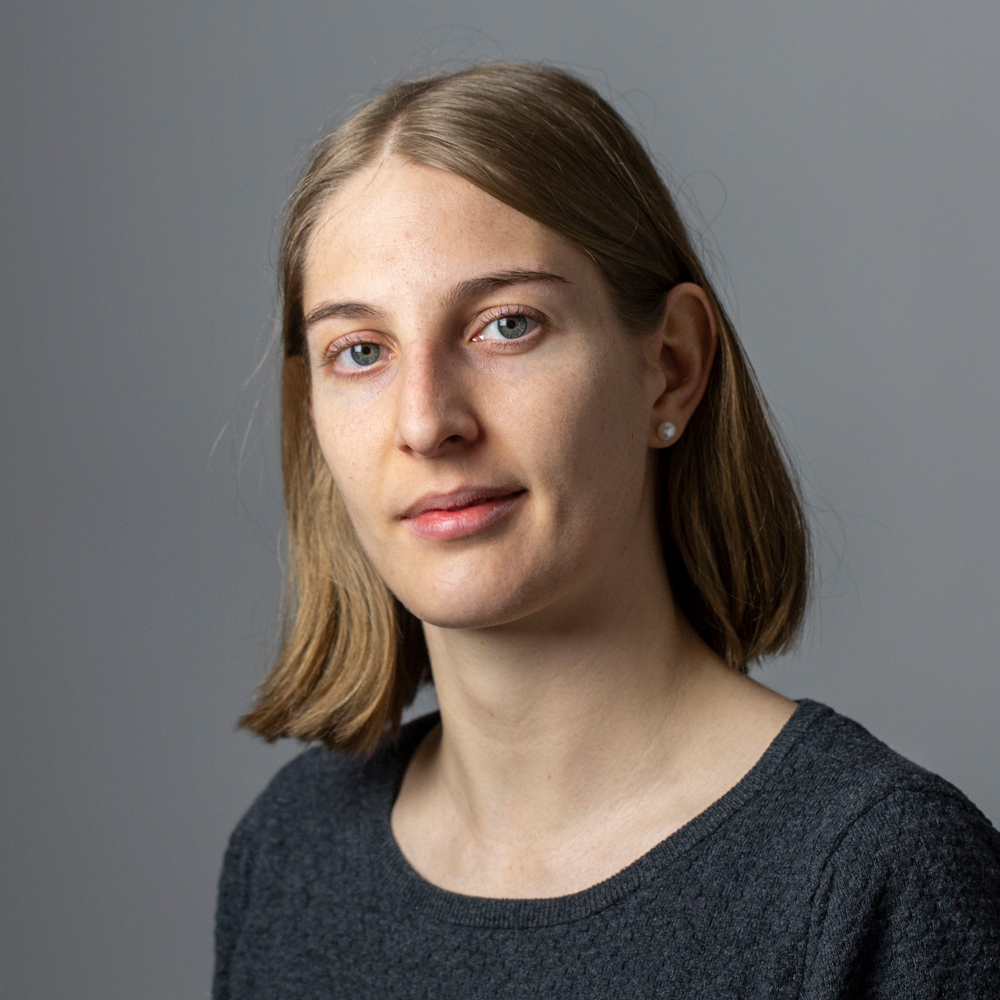
You can find an overview of ongoing debates with our journalists here . Please join us!
If you want to start a conversation about a topic raised in this article or want to report factual errors, email us at english@swissinfo.ch.